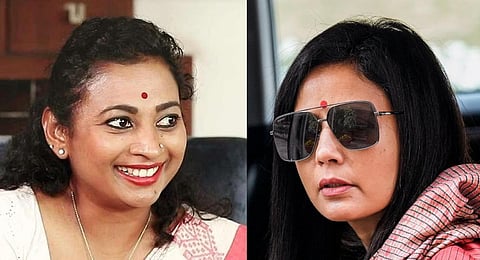

CHENNAI: I have terrible taste in men, Indian Member of Parliament Mahua Moitra told The Guardian recently. The comment was not a throwaway revelation — it was related to character assassination attempts made on her using a cropped photograph, which she believes an ex leaked.
Moitra is currently being investigated by the Ethics Committee on corruption charges, which she says are fabricated because she is an Opposition politician — and a woman.
Moitra is a rising leader, and a dissident voice in more than one way. In hitting back, she has been speaking to the press both internationally and in the country, and overtly so about the misogyny she personally experiences. “Disobedient women are here to stay. Get used to it,” she posted on social media, linking to one such interview about her potential expulsion.
Whether the articles focus on fluffy topics like her preferred luxury brands, or more directly address the political ramifications she is facing now, the overall effect posits Moitra as a politician who has been the target of specific kinds of attacks because she is not only a woman, but a certain kind of woman.
Rebecca Mammen John, a senior advocate at the Supreme Court of India, was quoted in the same British profile of Moitra as describing her friend and her friend’s detractors as follows: “The Indian man, more so the politician, cannot handle a woman who has a brain, is well educated, understands finance, is confident, and exercises sexual agency. That’s why the right goes after her.”
There have been numerous Indian women politicians through the decades, obviously — each with her own personal values and public alignments, and ways of coping with or pandering to societal, patriarchal and institutional expectations. Even those who have behaved as patriarchal agents themselves are oppressed by the system they seek to uphold. Others directly critique misogyny, which is not necessarily the same as having a feminist-informed political compass that is intersectional and evolving.
Then there are some who have and operate by that compass, but don’t appear to be subversive. Lately, a kind of politician who is liberal in her life and isn’t afraid to be seen that way has also emerged. They know there is no connection between being seen as a goody-two-shoes and actually being good at their jobs. This is new in India — and it is interesting to observe.
While I dislike how politicians like Mahua Moitra and Nayana Motamma (of the Karnataka Legislative Assembly) are both well-intentionally and maliciously reduced to certain stereotypically modern proclivities, like a taste for wine or Western attire, there is something to be said for women like them being in the public eye and holding positions of authority. They are threats to the establishment not just in terms of the competition they present to conservative or even fascist politicians and political parties.
They also present a challenge to “the establishment” as a collective, potent imaginary and a lived reality. They command respect because of the power they hold. The hope is that that respect then trickles down: to the ordinary woman, quietly or otherwise living a little or a lot askew to what society demands of her.